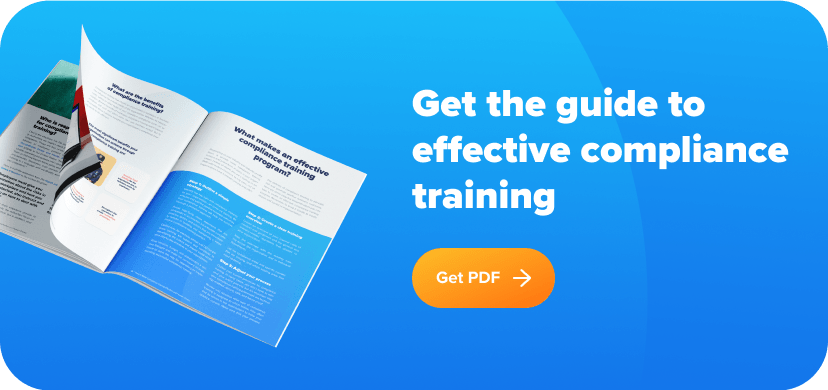Why it matters: Without proper training, your company could violate key Delaware employment laws, facing harsh penalties and lawsuits.
These topics can get dense and confusing. We’ll keep it brief and tell you exactly what you need to know. For more information, check out our training on each of these topics, which dive deep into the details of each law, and how your company can stay compliant.

Delaware Sexual Harassment Training
Delaware requires employers with at least four employees to provide each worker with an information sheet on workplace sexual harassment. Employers with 50 or more employees must also provide sexual harassment training for all workers and a separate training for supervisors.
Many states have laws encouraging sexual harassment training but, since 2019, Delaware mandates it for most companies. The requirements for compliance are extensive. Each covered employer must:
- Provide employees with interactive training and education on workplace sexual harassment prevention
- Train new employees within one year of their start date
- Train all employees on:
- The illegality of sexual harassment
- Define sexual harassment
- Provide examples of workplace sexual harassment
- Describe the legal remedies and complaint process
- Direct employees to the Delaware Department of Labor for additional information and to file complaints
- Prohibition of retaliation for making a complaint
- Train new supervisors within one year of their start date or one year of their promotion into a role overseeing other employees. This training must include:
- Training on the responsibilities a supervisor has in preventing and correcting sexual harassment
- Training on prohibition against retaliation
- Both employee and supervisor training must be repeated every two years

Delaware Minimum Wage
The current minimum wage in Delaware is $11.75. For tipped employees, the minimum wage is $2.23 per hour. If a tipped worker does not receive enough tips to make their average minimum wage at least $10.50 per hour, the employer must make up the difference. Expect the minimum wage to keep increasing on an annual basis.
Delaware Paid Family Leave
The Healthy Delaware Families Act became law in 2022. It provides up to 12 weeks of paid leave for covered employees, up to 80 percent of the employee’s average weekly wage. It also provides job protection for the employee.
Workers may take leave under this law for the following reasons:
- To care for a child during the first year after birth, adoption, or placement through foster care
- To care for a family member with a serious health condition
- To care for the employee’s own serious health condition that results in the worker being unable to perform the functions of their job
Employers with at least 10 employees working in Delaware must contribute to the state program and provide paid leave. Employees who take leave are entitled to continue their employer sponsored health benefits. There is a cap on the amount of leave a worker can take, set at 12 weeks per year after they’ve worked for their employer for at least 1250 hours in the previous 12 months.
If an employer violates this law, they may be subject to damages. This may include repaying an employee’s lost wages, any actual damages caused by denying leave, attorneys’ fees, job reinstatement, and fines from the state.

Salary History Ban
Delaware employers are prohibited from asking applicants about their prior employment compensation. Delaware’s salary history ban law forbids employers from seeking compensation history from the applicant or from a current or former employer of the applicant.
Employee Monitoring
Delaware law prohibits employers from monitoring any phone calls, internet traffic, or any other electronic correspondence and communication of its employees. However, an employer may do so if:
- The employer provides a daily notice every time employees access the network, use electronic communications, or use phone services
- The employer provides a one-time notice of monitoring to every employee, in writing, and has a signed copy of such notice for each employee
Employers must meet both criteria. If found in violation, employers may be subject to state fines and penalties.
Pregnancy Discrimination & Breastfeeding
According to Delaware’s Pregnant Workers Fairness Act, employees are entitled to job protection when they take pregnancy leave. This protection applies if they take additional leave due to birth complications or other related medical issues.
This law also protects employees who need to breastfeed at work. Breastfeeding breaks are mandatory under this law. Employers must provide the following:
- A designated, private room to breastfeed that is not a bathroom
- Breastfeeding breaks may occur up to one year after the child’s birth
- The break time is determined by the employer
- Breastfeeding breaks are compensated and not considered an unpaid break
Delaware Whistleblower Protection Program
The Delaware Whistleblowers’ Protection Act provides protection to employees when making a whistleblower complaint. Employers cannot terminate, threaten to terminate, discriminate against, or retaliate against an employee making a complaint. Covered whistleblower actions by employees include:
- An employee about to report a violation that has or will occur
- An employee about to take part in an investigation or hearing held by a public body in connection with a violation at the workplace
- An employee about to report an infraction to a supervisor or a public body
Labor Law Poster Requirements
Delaware has consolidated labor law posting requirements into one simple poster. Employers must post this in a conspicuous place in the workplace. If a company has remote workers in Delaware, whether the company has an office in Delaware or in another state, they’re required to provide notice to those Delaware employees.
This requirement may be achieved by posting the notice electronically on a company message board or website that all employees can access or by emailing the poster to all employees. If you do the latter, we recommend sending the poster at least annually.
Medical Marijuana Laws
Delaware law allows for medical marijuana use. An employer may not refuse to hire, terminate an employee, or take adverse employment action against an employee upon a positive drug test for marijuana if such use falls under this law, and is used at the direction of an approved healthcare provider.

Key Takeaways
- Delaware employers must provide sexual harassment training for all workers and a separate training for supervisors.
- Delaware’s salary history ban law forbids employers from seeking compensation history from the applicant or from a current or former employer of the applicant.
- Medical marijuana use is allowed under Delaware law but cannot be used as grounds for adverse employment action by an employer against an employee.
Your Next Steps
It’s important to stay compliant with Delaware employment laws, and that means making sure your HR teams are properly trained on the ever-changing regulations. You don’t want to be caught off guard and end up facing a lawsuit.
To help you, partner with a training platform that does the hard work for you, so you can focus on your core business needs. With eloomi, we make sure your compliance training is up to date and contains accurate information to help guide and support your employees in their work.
Get in touch to learn more, or get pre-built compliance training bundles.





